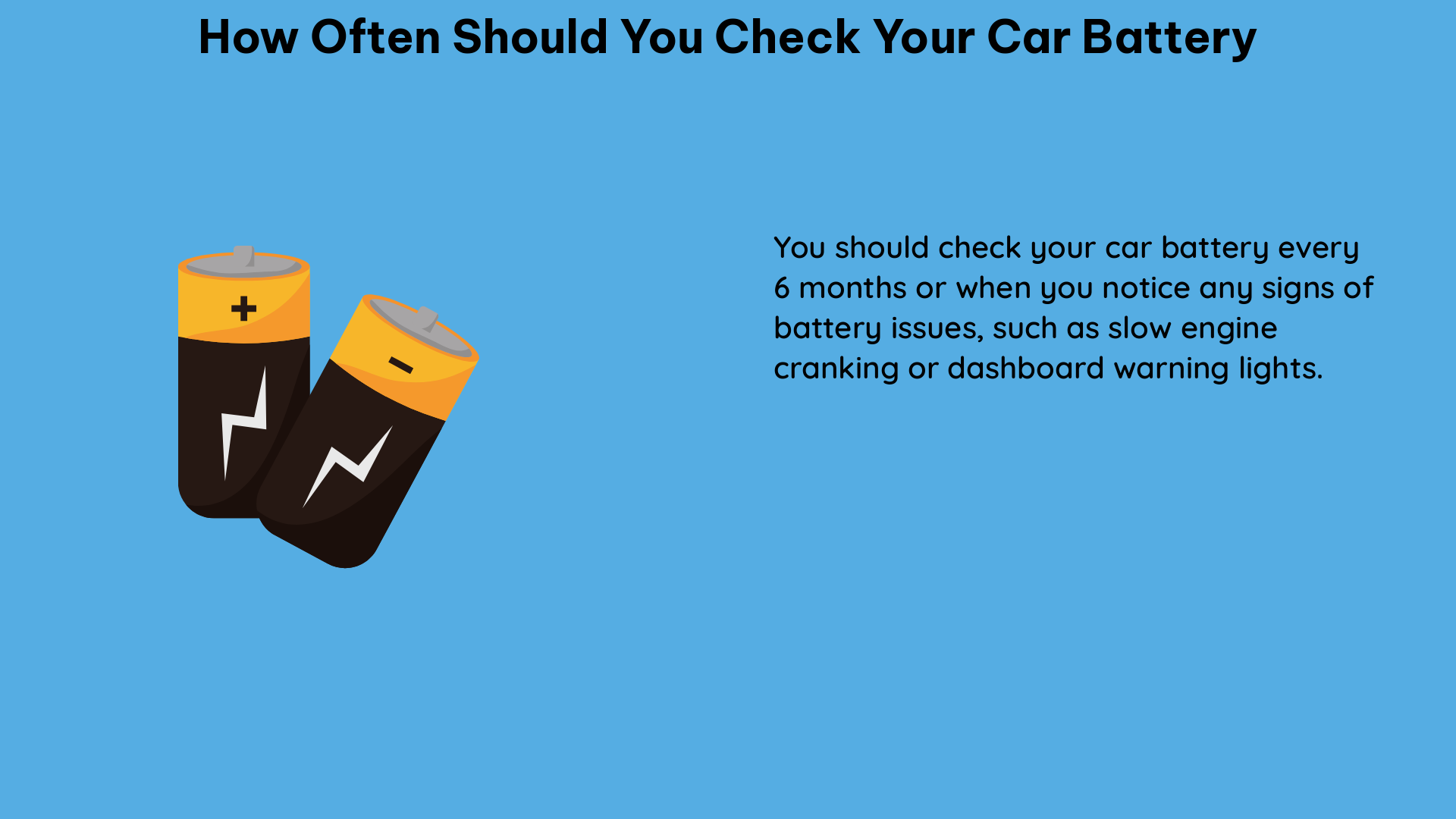Maintaining the health of your car’s battery is crucial for ensuring reliable performance and avoiding unexpected breakdowns. The frequency with which you should check your car battery depends on various factors, including the age of the battery, the climate you live in, and the type of vehicle you drive. This comprehensive guide will provide you with the necessary information to understand when and how to properly inspect your car battery.
Recommended Battery Inspection Frequency
According to OPTIMA Batteries, if your battery isn’t stored on a quality battery charger or maintainer, you should check the battery voltage at least once a month. This is because batteries that aren’t maintained can experience sulfation, which can diminish capacity, performance, and longevity. Fully-charged OPTIMA REDTOPs and most flooded lead-acid batteries should measure approximately 12.6-12.8 volts, while YELLOWTOPs should measure approximately 13.0-13.2 volts.
Jiffy Lube recommends having your car battery inspected at least twice per year, or every 6 months or 6,000 miles. In between inspections, you should also pay attention to any signs that your battery may be failing, such as:
- Dim or weak exterior or interior lights
- A clicking sound when you turn your key in the ignition
- The “charging” light illuminating on the instrument cluster
- Slow cranking during engine start-up
Tire Kingdom notes that most car batteries are rated to last about five years, but this can vary depending on factors such as driving habits and weather conditions. Blain’s Farm & Fleet recommends testing your car battery every four to five years, as the average car battery lasts about four and a half years in the U.S.
DIY Battery Voltage Checking

To check your car battery voltage yourself, you’ll need a multimeter or a battery tester. Here’s a step-by-step guide:
- Safety first: Make sure your car is turned off and the keys are out of the ignition.
- Locate the battery: Open the hood of your car and locate the battery. It should be secured in a battery tray and have a positive and negative terminal.
- Set up your multimeter or battery tester: Set your multimeter to the DC voltage setting, or consult your battery tester’s instructions.
- Check the voltage: Touch the positive (red) probe of your multimeter or battery tester to the positive terminal of the battery, and the negative (black) probe to the negative terminal.
- Interpret the results: A fully-charged battery should read around 12.6 volts. If the voltage is lower, it may indicate that the battery is not fully charged or that there is an issue with the charging system.
Remember, if you’re not comfortable checking your car battery yourself, it’s always best to take your vehicle to a professional for a battery inspection.
Technical Specifications
When it comes to technical specifications for car batteries, there are a few key metrics to consider:
| Metric | Description |
|---|---|
| Cold Cranking Amps (CCA) | This measures the number of amps a battery can deliver at 0°F for 30 seconds while maintaining a voltage of at least 7.2 volts. A higher CCA rating means that the battery can provide more power to start the engine in cold weather. |
| Reserve Capacity (RC) | This measures the number of minutes a fully-charged battery can deliver 25 amps at 80°F while maintaining a voltage of at least 10.5 volts. A higher RC rating means that the battery can provide more power for longer periods of time. |
| Amp-Hour (Ah) Rating | This measures the amount of energy a battery can store. A higher Ah rating means that the battery can provide more power over a longer period of time. |
When choosing a car battery, it’s important to consider the specific needs of your vehicle. Consult your vehicle’s owner’s manual or a knowledgeable battery retailer to ensure that you choose a battery with the appropriate specifications for your vehicle.
By following the recommended inspection frequency and understanding the technical specifications of your car battery, you can proactively maintain its health and avoid unexpected breakdowns. Regular battery checks are a crucial part of responsible vehicle ownership and can help ensure your car’s reliable performance for years to come.
References:
- How Often Should You Check Battery Voltage? – optimabatteries
- When to Have Your Car Battery Checked – Jiffy Lube
- How often should I check my car battery? – Tire Kingdom

The lambdageeks.com Core SME Team is a group of experienced subject matter experts from diverse scientific and technical fields including Physics, Chemistry, Technology,Electronics & Electrical Engineering, Automotive, Mechanical Engineering. Our team collaborates to create high-quality, well-researched articles on a wide range of science and technology topics for the lambdageeks.com website.
All Our Senior SME are having more than 7 Years of experience in the respective fields . They are either Working Industry Professionals or assocaited With different Universities. Refer Our Authors Page to get to know About our Core SMEs.